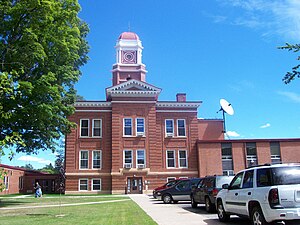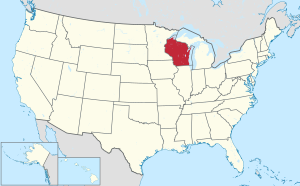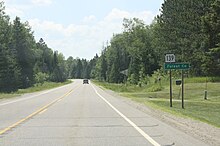Forest County, Wisconsin
Forest County | |
|---|---|
 Forest County Courthouse | |
 Location within the U.S. state of Wisconsin | |
 Wisconsin's location within the U.S. | |
| Coordinates: 45°40′N 88°47′W / 45.67°N 88.78°W | |
| Country | |
| State | |
| Founded | 1885 |
| Seat | Crandon |
| Largest city | Crandon |
| Area | |
| • Total | 1,046 sq mi (2,710 km2) |
| • Land | 1,014 sq mi (2,630 km2) |
| • Water | 32 sq mi (80 km2) 3.1% |
| Population | |
| • Total | 9,179 |
| • Estimate (2023) | 9,325 |
| • Density | 9.1/sq mi (3.5/km2) |
| Time zone | UTC−6 (Central) |
| • Summer (DST) | UTC−5 (CDT) |
| Congressional district | 7th |
| Website | www |
Forest County is a county in the U.S. state of Wisconsin. As of the 2020 census, the population was 9,179.[1] Its county seat is Crandon.[2] The Forest County Potawatomi Community and the Sokaogon Chippewa Community have reservations in Forest County.
History
[edit]Forest County was created by the Wisconsin State Legislature in 1885 from portions of neighboring Langlade and Oconto counties.[3][4] The county was named for the forests contained within its limits.[5]
Geography
[edit]According to the U.S. Census Bureau, the county has a total area of 1,046 square miles (2,710 km2), of which 1,014 square miles (2,630 km2) is land and 32 square miles (83 km2) (3.1%) is water.[6] The second highest elevation in the state of Wisconsin is Sugarbush hill which is in Forest County.[7]
Adjacent counties
[edit]- Florence County - northeast
- Marinette County - east
- Oconto County - southeast
- Langlade County - southwest
- Oneida County - west
- Vilas County - northwest
- Iron County, Michigan - north
Major highways
[edit]Railroads
[edit]Buses
[edit]Airport
[edit]National protected area
[edit]- Nicolet National Forest (part)
Demographics
[edit]| Census | Pop. | Note | %± |
|---|---|---|---|
| 1890 | 1,012 | — | |
| 1900 | 1,396 | 37.9% | |
| 1910 | 6,782 | 385.8% | |
| 1920 | 9,850 | 45.2% | |
| 1930 | 11,118 | 12.9% | |
| 1940 | 11,805 | 6.2% | |
| 1950 | 9,437 | −20.1% | |
| 1960 | 7,542 | −20.1% | |
| 1970 | 7,691 | 2.0% | |
| 1980 | 9,044 | 17.6% | |
| 1990 | 8,776 | −3.0% | |
| 2000 | 10,024 | 14.2% | |
| 2010 | 9,304 | −7.2% | |
| 2020 | 9,179 | −1.3% | |
| U.S. Decennial Census[8] 1790–1960[9] 1900–1990[10] 1990–2000[11] 2010[12] 2020[1] | |||
2020 census
[edit]As of the census of 2020,[1] the population was 9,179. The population density was 9.1 people per square mile (3.5 people/km2). There were 8,604 housing units at an average density of 8.5 units per square mile (3.3 units/km2). The racial makeup of the county was 80.7% White, 13.4% Native American, 0.3% Black or African American, 0.2% Asian, 0.1% Pacific Islander, 0.2% from other races, and 5.1% from two or more races. Ethnically, the population was 1.7% Hispanic or Latino of any race.
2000 census
[edit]As of the census[13] of 2000, there were 10,024 people, 4,043 households, and 2,769 families residing in the county. The population density was 10 people per square mile (3.9 people/km2). There were 8,322 housing units at an average density of 8 units per square mile (3.1 units/km2). The racial makeup of the county was 85.86% White, 11.30% Native American, 1.18% Black or African American, 0.17% Asian, 0.04% Pacific Islander, 0.23% from other races, and 1.22% from two or more races. 1.08% of the population were Hispanic or Latino of any race. 34.3% were of German, 11.4% Polish, 7.4% Irish and 5.4% American ancestry. 95.5% spoke English, 1.4% Spanish and 1.0% Potawatomi as their first language.
Out of the 4,043 households, 29.20% had children under the age of 18, 54.00% had a married couple living together, 9.80% had a female householder with no husband present, and 31.50% were non-families. 28.20% of all households were made up of individuals living alone, and 13.20%, of individuals of 65 years of age or older living alone. The average household size was 2.39 and the average family size was 2.89.
The age distribution in the county's population was as follows: 25.30% under the age of 18, 7.80% from 18 to 24, 23.90% from 25 to 44, 23.80% from 45 to 64, and 19.30% 65 years of age or older. The median age was 40 years. For every 100 females there were 100.20 males. For every 100 females age 18 and over, there were 99.00 males.
In 2017, there were 102 births, giving a general fertility rate of 71.1 births per 1000 women aged 15–44, the 14th highest rate out of all 72 Wisconsin counties.[14] There were fewer than five reported induced abortions performed on women of Forest County residence in 2017.[15]
Communities
[edit]
City
[edit]- Crandon (county seat)
Towns
[edit]Census-designated places
[edit]Unincorporated communities
[edit]Ghost towns/neighborhoods
[edit]Images
[edit]-
Law Enforcement Center
-
Forest County Veterans Memorial
Politics
[edit]From its founding in 1885 until 1928, Forest County voted for the Republican candidate in all but three elections, voting for the Democratic candidate in 1892 and 1912, and voting for Progressive candidate and native Wisconsinite Robert M. La Follette in 1924. Then, from 1932 to 1996, the county voted Democratic in every election with the exception of four nationwide Republican landslides in 1952, 1956, 1972, and 1984. In 2000 and 2004, Forest County backed George W. Bush in both of his successful runs for the presidency, though doing so by less than 6% both times. The county shifted back to Democratic hands in 2008 and 2012, with Barack Obama taking the county in his two successful elections. However, since 2016, Forest County has shifted significantly to the right. In 2016, Donald Trump received over 61% of the vote in the county, the highest any candidate has received since 1964, winning by over 26% against Hillary Clinton. Trump further improved on his numbers in 2020, taking over 65% of the county's vote and winning by a margin of over 30% against Joe Biden, turning in the best performance by a Republican in Forest County since Warren G. Harding a century earlier.
| Year | Republican | Democratic | Third party(ies) | |||
|---|---|---|---|---|---|---|
| No. | % | No. | % | No. | % | |
| 2020 | 3,285 | 65.01% | 1,721 | 34.06% | 47 | 0.93% |
| 2016 | 2,787 | 61.32% | 1,579 | 34.74% | 179 | 3.94% |
| 2012 | 2,172 | 46.73% | 2,425 | 52.17% | 51 | 1.10% |
| 2008 | 1,963 | 41.92% | 2,673 | 57.08% | 47 | 1.00% |
| 2004 | 2,608 | 50.61% | 2,509 | 48.69% | 36 | 0.70% |
| 2000 | 2,404 | 50.98% | 2,158 | 45.76% | 154 | 3.27% |
| 1996 | 1,166 | 29.41% | 2,092 | 52.76% | 707 | 17.83% |
| 1992 | 1,393 | 31.89% | 1,904 | 43.59% | 1,071 | 24.52% |
| 1988 | 1,845 | 46.02% | 2,142 | 53.43% | 22 | 0.55% |
| 1984 | 2,296 | 50.53% | 2,214 | 48.72% | 34 | 0.75% |
| 1980 | 2,070 | 44.29% | 2,402 | 51.39% | 202 | 4.32% |
| 1976 | 1,604 | 37.84% | 2,574 | 60.72% | 61 | 1.44% |
| 1972 | 1,856 | 49.77% | 1,678 | 45.00% | 195 | 5.23% |
| 1968 | 1,264 | 40.14% | 1,470 | 46.68% | 415 | 13.18% |
| 1964 | 1,069 | 30.10% | 2,479 | 69.79% | 4 | 0.11% |
| 1960 | 1,653 | 47.04% | 1,851 | 52.68% | 10 | 0.28% |
| 1956 | 2,039 | 57.03% | 1,527 | 42.71% | 9 | 0.25% |
| 1952 | 1,990 | 52.47% | 1,791 | 47.22% | 12 | 0.32% |
| 1948 | 1,251 | 35.11% | 2,208 | 61.97% | 104 | 2.92% |
| 1944 | 1,391 | 36.22% | 2,436 | 63.44% | 13 | 0.34% |
| 1940 | 1,672 | 36.04% | 2,951 | 63.61% | 16 | 0.34% |
| 1936 | 1,334 | 29.42% | 3,092 | 68.18% | 109 | 2.40% |
| 1932 | 768 | 22.50% | 2,595 | 76.03% | 50 | 1.46% |
| 1928 | 1,918 | 52.82% | 1,677 | 46.19% | 36 | 0.99% |
| 1924 | 1,104 | 40.74% | 299 | 11.03% | 1,307 | 48.23% |
| 1920 | 1,429 | 75.13% | 379 | 19.93% | 94 | 4.94% |
| 1916 | 738 | 52.19% | 637 | 45.05% | 39 | 2.76% |
| 1912 | 518 | 38.37% | 567 | 42.00% | 265 | 19.63% |
| 1908 | 1,023 | 71.69% | 324 | 22.70% | 80 | 5.61% |
| 1904 | 991 | 82.51% | 160 | 13.32% | 50 | 4.16% |
| 1900 | 378 | 76.83% | 95 | 19.31% | 19 | 3.86% |
| 1896 | 406 | 68.01% | 172 | 28.81% | 19 | 3.18% |
| 1892 | 223 | 47.35% | 228 | 48.41% | 20 | 4.25% |
See also
[edit]References
[edit]- ^ a b c d "2020 Decennial Census: Forest County, Wisconsin". data.census.gov. U.S. Census Bureau. Retrieved July 12, 2022.
- ^ "Find a County". National Association of Counties. Archived from the original on May 31, 2011. Retrieved June 7, 2011.
- ^ "Forest County, Wis., government website". Retrieved November 24, 2014.
- ^ "Wisconsin: Individual County Chronologies". Wisconsin Atlas of Historical County Boundaries. The Newberry Library. 2007. Archived from the original on April 14, 2017. Retrieved August 13, 2015.
- ^ Gannett, Henry (1905). The Origin of Certain Place Names in the United States. Govt. Print. Off. pp. 128.
- ^ "2010 Census Gazetteer Files". United States Census Bureau. August 22, 2012. Retrieved August 4, 2015.
- ^ Dawson, Drew (August 14, 2023). "These are the 10 tallest peaks in Wisconsin". Journal Sentinel. Journal Sentinel. Retrieved November 5, 2023.
- ^ "U.S. Decennial Census". United States Census Bureau. Retrieved August 4, 2015.
- ^ "Historical Census Browser". University of Virginia Library. Retrieved August 4, 2015.
- ^ Forstall, Richard L., ed. (March 27, 1995). "Population of Counties by Decennial Census: 1900 to 1990". United States Census Bureau. Retrieved August 4, 2015.
- ^ "Census 2000 PHC-T-4. Ranking Tables for Counties: 1990 and 2000" (PDF). United States Census Bureau. April 2, 2001. Archived (PDF) from the original on October 9, 2022. Retrieved August 4, 2015.
- ^ "State & County QuickFacts". United States Census Bureau. Archived from the original on June 6, 2011. Retrieved January 18, 2014.
- ^ "U.S. Census website". United States Census Bureau. Retrieved May 14, 2011.
- ^ "Annual Wisconsin Birth and Infant Mortality Report, 2017 P-01161-19 (June 2019): Detailed Tables". Archived from the original on June 19, 2019. Retrieved June 19, 2019.
- ^ Reported Induced Abortions in Wisconsin, Office of Health Informatics, Division of Public Health, Wisconsin Department of Health Services. Section: Trend Information, 2013-2017, Table 18, pages 17-18
- ^ Leip, David. "Dave Leip's Atlas of U.S. Presidential Elections". uselectionatlas.org. Retrieved February 8, 2021.
Further reading
[edit]- Youth Community Conservation Improvement Program. Memories of Forest County: A Historical Research Project. n.p., n.p., 1980.
External links
[edit]- Forest County
- Forest County map from the Wisconsin Department of Transportation
- Forest County tourism
- Forest County Potawatomi
- City of Crandon




